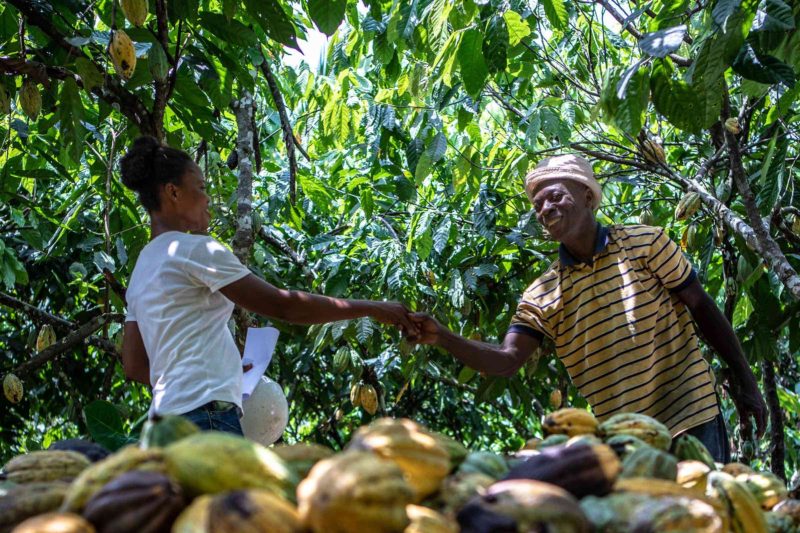Fairtrade joins with Mars and Ecookim for Ivory Coast cocoa farmer support venture

Smallholder farmers in West Africa should be part of the climate solutions, says Fairtrade (pic, Ben Rotthoff, Koa)
Fairtrade has joined with Mars and co-operative organisation Ecookim for a key initiative seeking to drive the delivery of improved wages for farmers within Ivory Coast, writes Neill Barston.
Known as the Livelihoods Ecosystem Advancement Programme (LEAP), the combined group believe that the latest scheme will offer a package of comprehensive measures to offer vital supporting agricultural communities serving the global confectionery sector.
As the teams behind the venture explained to Confectionery Production, its initial plan centres on supporting 5,000 smallholder farmers attain a living income by 2030 – which it hopes will serve as a blueprint for wider living income for the industry, with around 1 million people believed to be working in the sector in Ivory Coast alone.
According to figures reported from the World Bank, the number of farmers living below the global poverty line stands at around 550,000 – underlining the vast scale of the challenge in supporting the sector, which has been further hit by the ongoing impact of the pandemic, reduced cocoa prices, major rises in fertiliser costs and wider economic uncertainty.
In response, the latest initiative will aim to strengthen farmer cooperatives with access to market for their crops and other non-farm goods, as well as focusing on diversified farmer income. It will also enable financial services like savings and loans, and mobile banking, to offer further direct assistance to enable agricultural workers to plan their operations.
Aminata Bamba, Ecookim Head of Sustainability, welcomed the launch of the latest initiative in Ivory Coast. She said: “This program takes a holistic approach and seeks to address all elements necessary for a Living Income, rather than treating them in isolation or searching for ‘silver bullets’.
“Farmers may know best what needs to be done to improve their crops and their livelihoods but might not have the market support to make those changes.”
Commenting on the venture, which is supported by the Conseil du Café Cacao cocoa body, Mars Director for Public Affairs West Africa, Anne-Marie Yao, also believed the venture would have a positive impact.
She said: “Our goal of creating a more inclusive, modern and sustainable cocoa supply chain can only be achieved if farmers are fairly rewarded for their crucial role in producing the cocoa used in beloved chocolate brands. That’s why we developed our Cocoa for Generations strategy and it’s why today we’re working with Fairtrade and Ecookim to develop an ambitious blueprint that may be scaled to enhance farm resilience and support cocoa farmers on a path to a living income.”
As the collaborative group behind the scheme added, it will work on a number of core areas that have previously proved a key challenge for delivering improved conditions for farmers, namely the lack of access to finance, as well as adapting to climate change conditions.
The group noted that the bulk of cocoa today is grown on small family farms with little access to electricity, clean water, reliable roads, or quality schools.
Compounding these challenges are negative effects of climate change and persistent market failures, such as disconnection from formal financial systems, underdeveloped cooperative management practices, and lack of alternative income sources to offset market volatility.
As the venture added, these obstacles can leave cocoa farmers in poverty, unable to invest in or grow their businesses due to factors beyond their control. Despite past industry attempts to improve farmer livelihoods, the unfortunate reality is that smallholder farmer poverty has not been eradicated.
Crucially, the group added that it is understanding the fact there is no ‘average’ cocoa farmer that is critical in providing support, and as such its programme will focus on creating individual development support.
The Minister for Agriculture and Rural Development, M. Kobenan Kouassi Adjoumani, which is also backing the scheme, added: “I am particularly impressed with this approach, which seeks to be holistic and combine best practice interventions to achieve living income. As emphasised by the partners growers know better than anyone what needs to be done to improve their crops and livelihoods. I particularly appreciate that the partners are committed to learning together alongside growers to understand what works best for them and their households. The “try and learn” approach of the programme is extremely interesting, and I, personally, look forward to discovering what has worked well and what hasn’t.”
